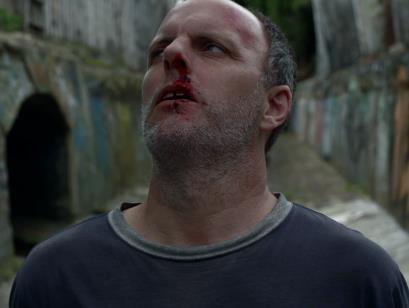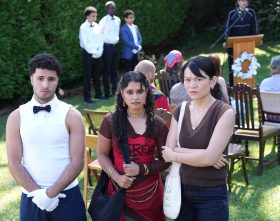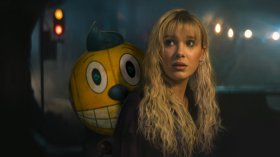A phone call conveys the news that no one would ever want to hear: a family torn apart by vicious crimes, and the agony of knowing that one of the perpetrators survives unpunished. Charlotte (Justina Noble, TV’s Neighbours) tells her brother-in-law Frances (filmmaker Simon J. Dutton) of the kidnapping, rape and murder of her daughter and the bare-survival of her scarred son, actively provoking a quest for revenge. ‘It’s hard to comprehend, to make sense of – and even harder to live with,’ she reminds him.
The Day of the Broken pieces together the aftermath of the crime, through the comings and goings of seven parties with potential connections to the illegal activity. Taking place over the course of a twenty-four-hour period, and populated with fractured people suffering through unhappy lives, the film makes the meaning of its title obvious – and also succeeds in its endeavours to weave its interrelated vignettes into a pained portrait of the shadows of society.
A despairing junkie (Greg Fleet, Underbelly), a suicidal patient (Lawrence Mooney, Conspiracy 365), a determined enforcer (Peter Finlay, Dying Breed): these are some of the characters that flit through actor/writer/director – and producer, editor and colourist – Dutton’s debut feature. Conversations drive the narrative, discussions about relatives and admissions of ailing mental health, worrying about life’s ills and sharing past grief, and ruminations on topics personal, trivial and troubled. Words conjure the weighty themes and establish the simmering unease. Dialogue furnishes protagonist backstories, and drives the central thrust of retribution.
There’s a pertinent point but little subtlety in Dutton’s use of constant talk to emote, evoke and inflame, and in the accompanying imagery that swaps between static chats, disturbing symbolism and energetic displays of violence. A sombrely atmospheric score composed by Deaf Centre emphasises the contemplative tone, inviting consideration of the film’s many juxtapositions: discourse versus action, most blatantly, but also the shades of grey that exist in the good versus evil and corruption versus innocence divides.
With director of photography Wayne McPherson (Lost Girl), Dutton repurposes his St Kilda setting with a perceptive, pervading air of futility and foreboding; again, the heightening of the lurid beyond the ordinary is ever apparent. Gloominess reigns in the film’s imagery, in fitting with its brutal pessimism. Underscoring its narrative bleakness, the feature lingers in alleys, streets, bars and cars, preferring the cover of night and clouds as it cycles between its characters – sans catharsis or neatness in resolution.
Performances service the story admirably, augmented for dramatic effect but never ostentatiously over the top – no easy feat given the non-professional status of much of its cast. A wry balance of comedy and thrills shines through in the portrayals, most evidently in the efforts and casting of comics Fleet and Mooney in perhaps the feature’s strongest turns. Once more, it is the contrast that resonates, with The Day of the Broken ruminating on disparity and darkness.
Rating: 3 stars out of 5
The Day of the Broken
Director: Simon J. Dutton
Australia, 2014, 88 mins
Release date: March 14
Distributor: Classic Cinemas
Rated: R
Actors:
Director:
Format:
Country:
Release:





